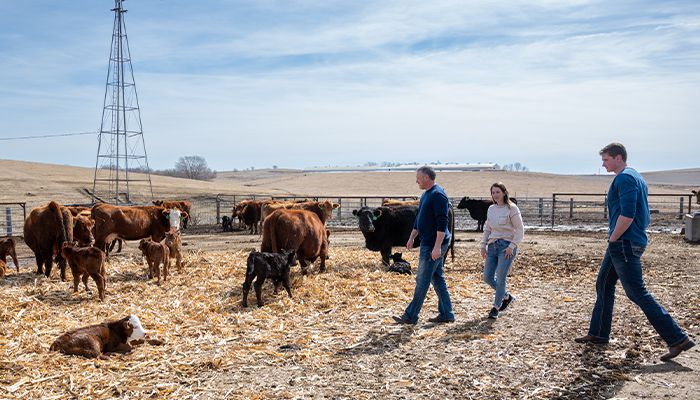Vintage Beef: Nostalgic taste meets modern customer service
Author
Published
5/19/2025
“We produce beef with the flavor you remember from eating beef straight off the farm,” says Deb Gress, who along with her husband, Aaron, raises and direct-sells beef near Charter Oak under the Vintage Beef brand.
Aaron and Deb Gress launched Vintage Beef on Gress Family Farms in 2017.
That was before COVID, before a new wave of consumers caught on to the benefits of buying beef from their local producer.
The venture started when Deb went to the freezer to get beef for supper. But this time, there was none. So she bought some at the local supermarket.
“My son wouldn’t finish his hamburger,” says Deb. “It just tastes different.”
Deb and Aaron sent out an inquiry on Facebook, and 50 people responded they would like to purchase locally raised beef. So they designated 10 steers and added direct sales to their existing farming operation of cattle, corn, soybeans and hay.
The first year they processed and sold 10 steers, mostly 10-20 pounds at a time, working farmers markets and promoting their website.
Then came COVID with its supply chain shortages and personal exposure risks.
“That year was our most exponential growth,” says Aaron. They soon had a waiting list. Fortunately, they had booked a whole year at the local locker. “As a young start-up, that saved our business.”
Last year, with the help of sons Dawson, 22; Peyton, 18; and Teagen, 13, they harvested 75 steers for their Vintage Beef business, in quantities ranging from single servings to whole beef.
“You can customize an order to fit your family’s needs with individual cuts, one of our bundles or freezer beef available in one-eighth, one-quarter, one-half or whole beefs. We offer free local delivery within a 30-mile radius, farm pick-up and nationwide shipping,” says Deb.
They sell through their website, gressfarms.com, the online retailer ChopLocal.com and local retail outlets. Social media helps spur promotion.
“Even with all the promotion, word of mouth is still the best and most consistent way to spread the word,” says Aaron.
Around 70-80% of sales are local, with around 50% in individual cuts and 50% in freezer beef. “We sort of assumed people would want to pick individual cuts to suit their tastes,” says Deb. “But it turns out they like not having to think about it.”

PICTURED ABOVE: The Gress family produces beef with the flavor you remember from eating beef straight off the farm. PHOTO / CONRAD SCHMIDT
Shopping at the farm
For people who want the hands-on shopping experience, Gress Farms also has a newly renovated on-farm store offering a variety of Iowa homegrown products.
The star of the show is, of course, the Vintage Beef. Dry aged to perfection and stored in new walk-in coolers, the Angus-Limousin cross has excellent marbling and gives the Gresses high yields. Animals are raised start to finish on the farm.
“We know what goes into them from the day we calve them to the day they are harvested,” says Deb.
“We serve the best ration. We don’t cut corners. If you give them the nutrients they need, they’ll give it back to you,” Aaron says.
Calves are fed corn raised on the Gress farm, distillers grain from the local ethanol plant and a kelp supplement that provides selenium and trace minerals to boost the animal’s immune system.
“In eight years, I haven’t had to treat a sick calf,” says Aaron. “They just don’t get sick.” If that should happen, they treat the animal individually and double the length of time until harvest. No growth hormones are used.
Calves are hand-fed in small groups to reduce stress. Research shows meat quality is less from animals that are stressed. “We want them to put all their energy into producing meat,” says Aaron.
He hand-picks the animals to be sent for harvest when they are perfectly finished, ensuring the best product possible.
The on-farm store also offers lamb, pork and honey produced by a neighbor and son Teagen’s eggs, as well as gourmet coffee, seasonings and a line of farm-inspired clothing.
Always looking for value-added opportunities, Deb sells beef tallow for cooking and for a skin moisturizer that she also sells in area boutiques.
“There will be more to come,” says Deb. She’s looking at other ways to use tallow, like combining it with beeswax to make lip balm. She’s experimenting with soap and candles, working to get the formula just right.
This summer, the store will add fresh produce from a neighboring farm, offering one-stop shopping for customers.
“We make good customer service a priority,” says Deb, “and finding new products is good customer service. To be in this business, you have to be flexible and willing to adjust to what your customers want.”
“At Vintage Beef,” adds Aaron, “the customer is king.”
Queck-Matzie is a freelance writer from Greenfield.
Want more news on this topic? Farm Bureau members may subscribe for a free email news service, featuring the farm and rural topics that interest them most!